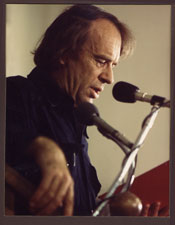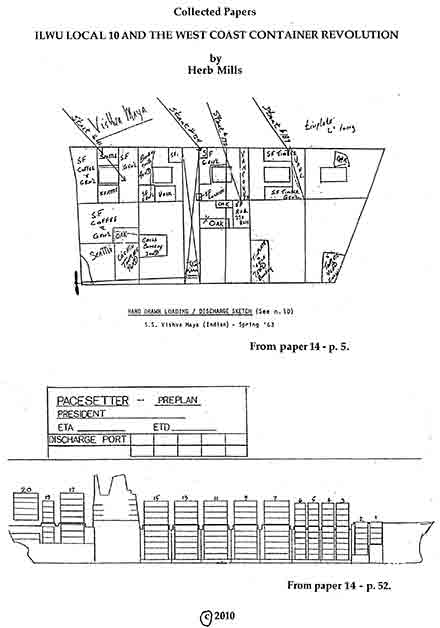
Herb Mills, 1979 |
PREFACE
... At this moment in the historical development of a capitalistic civilization in America -- including under "civilization" not only the economy, but politics, state organization, technology, and organized or "big science" - the critical challenge to radical democracy is to be as zealous in preventing things of great value to democracy from passing into oblivion as in bringing into the world new political forms of action, participation, and being toghether in the world. Radicals need to cultivate a rememberance of things past for in the capitalist civilization, which Schumpeter saw as based upon the principle of "creative destruction," memory is a subversive weapon. The ideology of progress fostered by science and capitalism depends upon the steady elimination of historical consciousness and of the customs, sensibilities, and textures of every day life nourished by that consciousness; just as it depends upon the emasculation of the critical function of theory. What is at stake simultaneously is the past and the future. Radicals cannot leave the past to conservatives; they need to remind themselves that they, too, have a rich past with democratic experience and wisdom, and that the arts of conservation have as much to do with learning how to live with the past as with learning how to live within nature and with other human beings. The subtitle of democracy states our highest aim: renewal and radical change.
Sheldon S. Wolin
Democracy, vol. 1, no. 1, January, 1981
Editorial, pp. 4 - 5.

As noted in the resume which follows, I was the teaching assistant for a UC Berkeley course on the history of political theory in the academic year of 1958 -59 and the year following. That course was taught by Sheldon S. Wolin .. a Professor of Political Science" at UCB from 1954 to 1970. From 1973 to 1987 he was likewise so engaged at Princeton University. And for more than fifty years Professor Wolin also had visiting appointments at Oberlin, UC -Santa Cruz, Cornell, and Oxford.
Having, again, begun my web site with a passage from his writings, this new introduction and guide to it should also begin with the following noted. When the publication in which that passage appeared arrived in my mail, I had already published what would become the first eight papers on my site. And as I continued to add papers to it, I finally decided to start it by citing it as above since it set out so very well what I still hoped to thereby help achieve: "... to save from oblivion " -- if no longer destruction, of course--something of "the customs, sensibilities, and textures" of what for me--and for all fellow dockers I came to know --was a profoundly democratic and satisfying way to collectively make a living - which is to say, by fairly and fraternally sharing the opportunity to do our taxing and hazardous work. But with more postings to my site and more still to come - I have also finally seen that in the absence of an introduction such as now follows, hopes of such order could surely be jeopardized by the many complex dimensions and components of the trade union consciousness those writings seek to detail or at least suggest.
Having begun to longshore in the fall of 1963, I retired in 1991 as a result of an on-the-job injury. And having worked as a docker for a dozen years and having been a gang steward for the last eight of those years, I began to be elected to serve San Francisco's Local 10 of the International Longshore and Warehouse Union as a Business Agent * and later, too, as its Secretary -Treasurer. ** This being so, I often had a front line role in struggles occasioned by what had long been called "the container revolution". And after the struggles which occurred during my time as a "B. A,", I began to publish what now are the first ten papers on this site. And those which then followed were written or drafted or first thought about during or subsequent to my Secretary-Treasurer years. And, as it happens, all of those years for both myself and Local 10 are also now reported upon in a permanent exhibit at the Smithsonian Institute. That exhibit may also be visited on the internet at Smithsonian -National Museum of American History -America on the Move -Explore Transportation -Work and Industry -Container Back Story or by clicking the Smithsonian link above.
---
* As may or may not be known by the reader, the designation of a union office as that of a "Business Agent" comes from the early years of the American labor movement. It meant then -as may also be known or not known -what it does today in the ILWU: that the office holder in question does the "union business" of enforcing the contract against the employer on behalf of the rank-and-file. Thus, in a word, , that office has nothing to do with "keeping the books" or "paying the bills".
** For the details of al1 of these years, see the resume which follows. It should here be noted, however, that all of the paid and full-time officers and the hiring hall job dispatchers of Local 10 are elected for one year terms. And those who have thereby served two years in a row must return to the docks and ships for at least one year. This is its version of what the Industrial Workers of the World (lWW) called a "back to the bench" rule, which, a.s might then be supposed, it was inspired to adopt by its "Wobbly" membership after its "big strike" of 1934. There is one Local 10 member, however, who is appointed to one of its many positions by its annually elected and unpaid, 35 -member Executive Board. That docker, who then serves at its pleasure, is the full-time and paid director of the local's "Drug and Alcohol Control Program."-the first of whom retired in 2009 after many years of highly regarded service. |